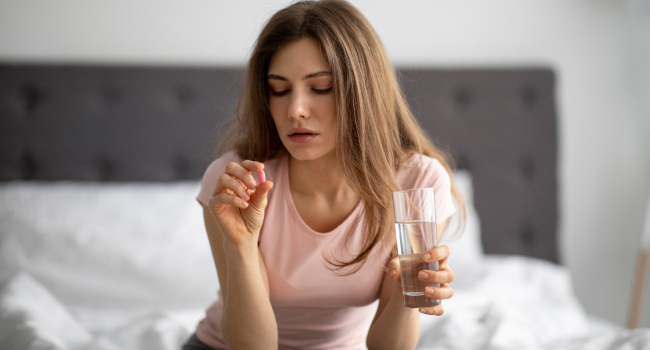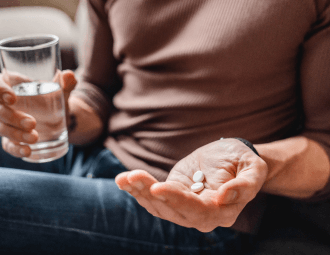Highlights
- Statistics show that the rate of depression is higher in women than men at a ratio of 2:1.
- The reasons for depression in women being higher than men may be due to psychological and social influences, genetics, and other biological factors.
- Certain types of depression are specific to women.
- Many women experience depression during and after pregnancy; diagnosis is essential as there are potentially lifelong mental health implications for the mother and her child.
- Referral to a mental health professional is recommended with early signs of depression to prevent progression to clinical depression, which can have serious consequences.
If you’ve been concerned recently about your wife, daughter, partner, or friend because they have not been acting like their typical selves and they seem down and tearful a lot of the time, consider the possibility of depression.
According to the World Health Organization (WHO),
In the USA, the statistics from a
There are also economic consequences of depression. Globally it costs
In summary, what all these statistics are saying is:
- depression is common and affects various areas of life,
- it needs an early diagnosis,
- appropriate treatment is essential.
Undeniably, depression is a serious illness, but what role does gender play?

Is Depression More Common in Women?
Yes, it is—statistics show that your female loved one is more likely to have depression than her male counterpart. The APA confirms that women have a higher rate of developing depression than men; the WHO, in fact, reports it as 50% higher. Young women are more vulnerable and likely to show the first symptoms in late teens or their early 20s.
Some researchers challenge these statistical gender differences, claiming
What Raises the Chances of Depression in Women?
Many factors can influence the chances of a female getting depression. These include genetics, environmental conditions, gender disparities, and psychological issues.
Biological Factors
Genes
Brain Chemistry and Anatomy
Secondly, research suggests that the brain’s parts that help regulate the fear response, the amygdala, hippocampus, and prefrontal cortex, respond to stress differently in men and women. However, more evidence is needed as brain imaging done in other studies was inconclusive.
Hormones
Among the biological theories that explain the published gender differences in depression are hormonal fluctuations and hormone types. Most people reading this, women and men, will remember the turbulent emotional teenage years navigating puberty. Following this, a woman’s life is biologically regulated by fluctuating hormone levels until menopause.
Some research suggests that the type of hormone also affects how the brain processes negative emotions; female progesterone triggers a heightened response when compared to testosterone.
Psychological Factors
Anxiety
Research shows that anxiety rates are higher in women, as they are more concerned about negative feedback and may need more recognition to feel content. It is accepted that undiagnosed and untreated anxiety often leads to major depression.
Mood Swings
Mood instability, which often manifests as anger, is more common in women and is thought to result from hormone fluctuations.
Post-traumatic Stress Disorder (PTSD)
Other
Social and Environmental Factors
Traditional Roles
In many societies, men are the breadwinners, while women care for the family. However, with the advancement of women’s rights, the cost of living being higher, and single-parent families being more common, women often take on both roles: career and provider. Naturally, higher life pressures can result in higher rates of anxiety and, thus, depression.

Workplace Discrimination
Although it should not be the case, women in the workplace are often not given the same opportunities or salaries as their male counterparts. This occupational stress contributes to anxiety and depression.
Physical or Sexual Abuse
Signs and Symptoms of Depression in Women
The warning signs of depression in women are usually a sad or low mood lasting for at least two weeks, but there are other emotional and physical symptoms.
Emotional Symptoms
- Persistent sadness or tearfulness
- Feelings of worthlessness and guilt
- Continuous worry
- Irritability, agitation, or anger
- Loss of enjoyment in daily activities
- Mood swings
- Low self-esteem
- Difficulty concentrating
- Suicidal thoughts or plans
If you’re experiencing suicidal or self-harming thoughts and require immediate assistance, contact a crisis hotline, such as 911, 988 suicide & crisis lifeline (toll-free), or Samaritans (116-123 or via chat).
Physical Signs and Symptoms
Often, physical signs of depression in women follow the psychological symptoms, but this is not a rule.
- Unintentional significant weight loss or weight gain
- Physical aches in joints and muscles
- Exhaustion or fatigue
- Difficulty sleeping or a change in sleep pattern
- Attempted suicide
- Self-harm
Types of Depression in Women
The most common type of depression in females is major depressive disorder (MDD), also known as clinical depression or major depression. As the name suggests, it is a severe depression. Five or more symptoms listed in the DSM-V (Diagnostic and Statistical Manual of Mental Disorders) are present almost every day for two consecutive weeks before diagnosis.
There is a milder type, persistent depressive disorder, previously called dysthymia. This is defined as a low or depressed mood most of the day, more days than not, for two years or longer.
Sometimes, depressive symptoms might occur together with other mental health conditions: mood disorders such as anxiety disorders, bipolar disorder, or eating disorders. It is important to note that all the above diagnoses can also occur in men.
Do Some Types of Depression Affect Only Females?
There are, however, certain types of depression unique to women because of fluctuating hormone levels and women’s health that affect mood.
Perinatal and Postpartum Depression
The WHO reports that 10% of women are depressed during pregnancy or while giving birth, It is believed this may be underreported. The theories about possible triggers of depression in pregnancy are two-fold:
- hormonal changes from baseline and
- a drop in the mother’s physical health, such as deficiencies and fatigue.
Pregnancy-related Depression
Unfortunately, as mentioned, depression
- miscarriages,
- vaginal bleeding, and
- preterm birth.
Postpartum Depression (PPD)
On average, for
PPD is different from baby blues, which usually settles within ten days and causes milder emotional symptoms and poor sleep; 8 out of 10 new moms experience this brief emotional wobble.
On the other hand, the mother with PPD has similar symptoms and severity as major depressive disorder. In addition, she might not bond with her baby, which can have lifelong severe mental health implications for her child. Therefore, it is essential to consult an MD for PPD treatment.
Premenstrual Syndrome (PMS)
Next, we have mood changes related to the menstrual cycle. These were documented as early as 370 AD and are a normal reaction for most women.
Premenstrual tension (PMT) and premenstrual disorder (PMD) are other names for the same condition, and you can only be diagnosed with this disorder if you have all of the following:
- You have symptoms at least two menstrual cycles in a row.
- You experience the symptoms before your period starts.
- Your symptoms disappear after your period has begun.
- The symptoms affect your ability to function normally.
Premenstrual Dysphoric Disorder (PMDD)
PMDD is a severe form of PMS, and depression could be a core symptom for the women diagnosed with it. They must have five symptoms from the list below to get a diagnosis, with at least one being an extreme emotional change.
|
Symptoms of PMDD: DSM-V criteria |
|
|
Core symptoms
|
Additional symptoms
|
Perimenopausal Depression
Once again, as menopause approaches, the fluctuating hormones cause havoc, with 4 out of 10 women experiencing classic depression symptoms. There is no pattern this time, and they may occur for years. There is hope with treatments with antidepressants and hormone replacement therapy if appropriate.
Other Causes of Depression in Women
There are other medical causes of depression in women that need consideration during a consultation. Typical examples are
Physicians might also consider depression in women seeking treatment for sleep problems, those losing weight with no explanation, or gaining weight from binge eating.
Tips on How to Feel Better
Reach Out for Social Support
If you or a loved one are experiencing emotional symptoms of depression, your first step, which might be a hard one, is to reach out to family, friends, or a community group for social support. Often, getting a hug or just telling someone how you are feeling helps and makes it easier to seek professional help.
Support Your Health
When living with depression, it is more important than ever to live a healthy lifestyle. Incorporating the following tips every day might even help you to prevent depression from spiraling out of control.
Get Up and Get Moving
The theory is that exercise releases dopamine, a happy neurotransmitter. Although studies haven’t proved that exercise, alone, treats MDD, research has shown that it eases depressive symptoms, and this makes it a recommended part of any depression treatment regime endorsed by WHO.
Eat a Healthy, Depression-fighting Diet
It might sound cliche, but a healthy diet matters if you want to fight depression. An organic plant-based diet is preferable.
- Eat tons of greens, other vegetables, whole grains, and fruit
- Limit all processed meats and foods, animal and dairy fats, refined carbohydrates, and sugar.
In a
Remember to consult your doctor or a qualified nutritionist before making significant changes to your diet.
Get a Daily Dose of Sunlight
Top up your sunshine vitamin, Vitamin D (VD), which
- Depression symptoms are higher in VD-deficient people compared to those who aren’t.
- There are many VD receptors in the parts of the brain that regulate emotions.
- VD is important in the formation of serotonin.
- VD decreases inflammation related to a stress response that leads to depression.
According to a systematic review in 2023, VD deficiency is more common in women than men. So, ladies, aim to get 30 minutes of sunshine a day.
Challenge Negative Thinking
It is normal to feel low and anxious sometimes; life is hard. So, don’t judge your difficult emotions, and don’t force positivity. Instead, acknowledge them and use them as data to determine the trigger for the thought.
Three practical tips that indirectly challenge negative thinking:
- Aim to change the things you can, not those you can’t.
- Accept that bad things happen.
- Focus on the good in your life.
Try to incorporate these into your daily routine.
Get Professional Help
Even mild depression in women needs intervention to stop its progression. Early diagnosis will contribute to suicide prevention, which is a risk of any severe form of depression.
Therefore, it is essential to seek treatment from a mental health professional who will treat depression by therapist referral for behavioral or talk therapy and antidepressant medication when appropriate.
If you know or are an overwhelmed mom, businesswoman, or anyone who just can’t face leaving the house, getting help and medication via online consultations (if deemed appropriate) is possible, so book your appointment today.
Note that booking an appointment doesn’t guarantee obtaining a prescription. The decision is at the discretion of your healthcare provider.













